- Home
- Peter Grainger
In This Bright Future: A DC Smith Investigation Page 16
In This Bright Future: A DC Smith Investigation Read online
Page 16
‘It’s a security matter, sir.’
‘I see. But the members’ attendance at the parliament during a session are a matter of public record, aren’t they?’
She paused, obviously irritated but also experienced.
‘Yes they are, but published in summary at the appropriate time – not on a daily basis.’
‘I understand. Does Mr Quinn have extra security or is this standard procedure for all the MLAs?’
‘It is standard procedure, sir, though I have to say we don’t often get asked that sort of question.’
Good – she would remember Mr Reilly now.
‘It’s a rather important matter. I’ll have to find some other way of getting in touch with him, then.’
As he had hoped, she didn’t like the sound of that.
‘Mr Reilly – if you can give me some idea of what this is about, I will pass on the fact that you have been trying to get in touch with Mr Quinn.’
‘Would you? I would be very grateful. Can you do that this afternoon?’
‘Yes, I can.’
‘Wonderful. You have my number there, I take it. If you could tell him that it’s about his brother…’
A pause of several seconds. She might have been writing down his mobile number but when she spoke again, the cause of the delay became clear.
‘There must be some mistake, Mr Reilly. I have been Mr Quinn’s PA for several years. I know his family. He has three sisters but not a brother.’
If one of those tourists had taken a photograph at that moment, they would have caught on the face in the window, the ghost of a smile. Smith could not have asked for a better result.
He said, ‘Nevertheless, please pass on my message to Mr Quinn. It is about his brother.’
Smith caught a bus back into the city centre. It was unlikely that Quinn, even if he received the message in time, would want to meet Stuart Reilly in the Great Hall of Stormont – assuming that he would agree to meet him at all, of course. Better and safer to be in control of that potential meeting place oneself. He spent most of the journey considering what he would do in Lorcan Quinn’s position – and he would do something because the message that Smith had sent was a provocative one. Even the PA might have an innocent-sounding question for her boss about long-lost relatives. Quinn would, after some thought, reach out in an attempt to verify that ‘Stuart Reilly’ had resurrected himself in Belfast, but reach out to whom? McCain and O’Dell had both given the impression that Quinn had left them and the cause behind a long time ago, and that they despised him for it. On the other hand, someone as intelligent and as ruthless as Quinn would not have left himself with no resources to deal with those men and memories that might come out of their graves in an attempt to haunt him.
At the bus station, Smith sat down again on the same bench he had used earlier and went through the same security procedure – observing the ebb and flow of passengers. Security – Quinn might go that way, and alert the services, playing the responsible citizen anxious to avoid an incident. Stuart Reilly would not be the first soldier to go back and try to right some perceived wrong after many years. But Stuart Reilly had made a direct reference to Aidan Quinn. Could Lorcan Quinn, MLA, take even the slightest risk of having what Reilly might know put in front of a member of the PSNI? Smith didn’t think so. Quinn would have to come at this in some other way than that.
He had not eaten since the morning, and it looked as if he was going to need some more cash; booking three more nights with Mrs Greene had taken almost all that he had. These short city breaks are more expensive than one first imagines, he reflected, tapping his way along the pavements towards the general area of Joys Entry. There was sure to be a cash machine or two there and he quite fancied another muffin.
The first objective had been achieved and he was in the process of using the map on his phone when it began to ring. He looked at the number and did not recognise it – unsurprising as he did not recognise any mobile numbers unless they had the name from his contacts attached to them, which this one did not. He answered it anyway.
‘Good afternoon, sir. How are you today?’
Irish and professionally cheery – had PPI found him even here?
‘I was alright.’
‘That’s excellent, sir. Now I’m wondering if you could spare a few minutes of your time. If you can, there’s an exciting free offer in it for you at the end.’
‘I see. I expect it’s just a survey and you’re not trying to sell me anything.’
‘Absolutely not, sir. Just a few questions that’ll take up no more than ten minutes of your time. We are Eurex Marketing Services and…’
Smith looked at his watch as the voice performed its circus routine.
‘…so can you confirm for me first of all that you’re in beautiful Belfast this fine afternoon?’
It’s a mobile phone – it’s mobile, it could be anywhere. How would anyone know where he was if he had been called randomly? And ten minutes was more than enough time to trace a phone nowadays.
‘No, I can’t confirm that. Would you put Mr Quinn on, please?’
‘Who, sir? This is Eurex Mar-’
‘I’m going to hang up now. Tell Mr Quinn to call me directly so that we can make arrangements to meet. Goodbye.’
Any lackey could have made the call but if he was right about a trace? That meant the security services, and if he was right about that then he was surprised. He wasn’t usually surprised when he was right, quite the reverse, in fact, but it was only just over an hour since he had spoken to Quinn’s PA… Smith began to move on towards the city centre, wondering whether one of Waters’ drone things was already hovering overhead, ready to deploy a Hellfire missile or three. Did he actually need to turn his phone off as well? He couldn’t remember but if he did then the whole exercise became pointless anyway.
He found Lorraine’s again but not Lorraine. Her place had been taken by a young man in an apron, very business-like, managing to keep the establishment running smoothly despite a post-work rush that Smith had not expected. He found a different window seat and thought the whole matter through again. The call might have been a coincidence; maybe marketing companies do have ways of seeing where their targets are. Waters would know. Technology again, getting away from him, from Smith, but getting away from most other people as well, as far as he could see. Which wasn’t very far these days. Must get an eye-test…
The phone in his pocket was ringing again – a landline this time with a Belfast code. Why would they do that? Whoever it was, he needed to keep it short and sweet.
‘Hello? Stua… David, is that you?’
He recognised her voice immediately but waited for a few seconds, thinking and listening intently to the phone line.
‘Cati? What’s happened?’
‘Nothing. Well, I say nothing… I’m sorry to ring you like this, out of the blue.’
‘Who gave you the number?’
‘Diarmuid. Should he not? I don’t want to cause any trouble.’
‘No, it’s fine. Something’s happened – what is it?’
She was at home on her own, with Lia still at work and Bradey at his own place. The phone rang about twenty minutes ago, and there had been a man asking questions straight away. He said his name was Auster, from the city police, and would she mind answering a few questions? Then he was asking them anyway – had the O’Neill family been contacted by a man calling himself Stuart Reilly? This man had been making a nuisance of himself during the afternoon and there had been a complaint made. He had made mention of the O’Neill family in Hannahstown and that was why Mr Auster was calling – to warn them about this man, and to say that they should not become involved in whatever confidence trick he was trying to pull on the good citizens of Belfast.
Smith said, ‘The nuisance bit is true.’
‘You’ve not mentioned us like he said, have you?’
‘Yes – to Martin McCain and Michael O’Dell, both of whom knew perfectly well what I wa
s doing when I turned up. Neither of them is responsible for the phone call you received.’
‘So who is?’
He needed time to think now – this was in danger of turning into a mess, a potentially serious mess at that. Quinn had played an unexpected card.
‘We shouldn’t talk about this on the phone, Cati. I’ll catch a bus. I’m right here in the station.’
‘No. I’ll not be on my own for long and Lia will have too much to say when she hears about all this. I’ll come and pick you up. In the central bus station you say?’
He must have mis-heard but when he said as much, she insisted.
‘It’s the new medication. I often get a boost for a week or two. I need to make the most of them – I’m running out of options there. You must have seen my car. It’s adapted and I know I can drive today. Can you give me half an hour?’
Half an hour? After all that he had taken from them, he should be able to manage that. When she had gone, he thought about the Mr Auster nonsense. The story she had been told was ludicrous – for example, how many people had the surname O’Neill in Belfast, and how had they chosen the very ones? - and whoever had made the phone call knew it. The thing had been done had been done solely to alarm her and possibly to get her to confirm that Smith had already visited the O’Neill family. But it was something that he had not anticipated, and he didn’t like it.
Chapter Fourteen
‘When I rang Diarmuid he was in a meeting – with the bank, I think. I’m sure it was important. He said he’d deal with it later but I got your number from him. I never usually ring him at work, so he must have thought it was urgent. I shouldn’t have disturbed him like that but… And he’ll be ringing me soon enough, to find out what’s going on.’
The car had an automatic gearbox which was controlled by levers on the dashboard, and the standard driver’s seat had been replaced by something more bulky and complicated. As she chattered she drove, slowly but confidently, heading north but with no particular destination in mind that Smith could see.
‘So you’d better tell me what you’ve been doing this afternoon. You’ve plainly got up somebody’s nose.’
Catriona looked at him then, smiling, and Smith realised that she was enjoying herself despite her worries. It wasn’t difficult to imagine why that might be so.
He told her, summarising his day out in the city, and omitting a description of the reception that he had initially received from Michael O’Dell. He made no mention either of the possibility that someone was already aware of his presence in Belfast, already trying to track his movements. Through force of habit, he glanced occasionally in the side mirror of the car, having to lean forward a little to do so.
She said after a silence, ‘Lorcan Quinn. I never liked that man.’
It was true. He could remember her saying as much at the time, when they used to go to Rourke’s, and he knew then that she was saying it because she was concerned that Smith, or Stuart Reilly, was getting too close to the men who always sat around the same table in the bar and who sometimes disappeared one by one into the backrooms of that establishment.
‘And you think he knows something about Brann?’
Smith said, ‘It’s only a hunch but… Yes.’
He had not told her either about the message he had left with Quinn’s PA. The business about Aidan Quinn had to be solely between himself and Lorcan – no-one else could be involved in that.
‘Do you think the Inquiry spoke to him, then? He’s a big man now. Do you think they would?’
‘Perhaps – discreetly. He wouldn’t have to make much of denial before they’d back off. That’s my guess, anyway.’
They were approaching the north-western edge of the city, entering the suburbs a long way north of Hannahstown. Wherever she was taking him, it wasn’t home.
‘So who is this Mr Auster?’
‘He might be exactly who he says he is, a local copper. Or he might not. I could check without too much trouble but there isn’t any point. Directly or indirectly he’s responding to orders from Quinn or his security. I never mentioned the O’Neill family in Stormont but Auster did, and I’m certain nothing came from McCain or O’Dell. Either Lorcan Quinn remembered the connection himself or someone was very quick to look at records.’
‘They’ll have records going back that far? To all that? Thirty years?’
‘Oh, yes. And further. Don’t underestimate these people.’
And take your own advice there, he thought, because you just did that.
She drove without saying anything else for a couple of minutes, and Smith kept one eye on the wing mirror. Nothing to be concerned about, but the nagging thought that his phone made a following car redundant continued to trouble him.
Then she said, ‘I’m not blaming Diarmuid but we shouldn’t have stirred this up. It’s still dangerous, even now. It’s not worth anyone getting hurt.’
He did not answer immediately. The ground was rising and there was a hill on the horizon now – in fact the horizon was a hill and one that he recognised. They were on the Antrim road.
He said, ‘No-one has got hurt apart from when your brother tried to knock my head off. We’ll keep Diarmuid out of it. I don’t think you or yours are in any danger – it isn’t like it used to be, thank God. The phone call was to warn me off – to make me think I’m up against superior forces and out of my depth.’
She didn’t say anything else. After a pause he said, ‘And I’m not, by the way. I’ve got my twenty five metres certificate and a life-saving badge and everything.’
Catriona smiled and almost laughed but it was only momentary.
‘But y’are concerned – I know it.’
‘How do you know that?’
‘Why else d’you keep looking in the mirror? D’you think I’m going to get a speeding ticket?’
Cave Hill was Cave Hill Country Park now. Signs pointed the way towards the Visitors Centre, the adventure playground, the eco-trails, the orienteering routes, the footpaths graded according to length and difficulty, and to the restaurant further away in the castle. As she parked the car, Cati said, ‘Remember this?’ and he had said, ‘Yes, of course.’
She had brought him here on a spring afternoon, all those years ago. It was a thing to see, she had said, and everyone who comes to Belfast should see it from here before they leave. Not that there had been thoughts of leaving at that time. They were close by then, and getting closer. She had wanted to show him everything, all of the place in which she had lived her life so far, as an offering perhaps. And on Cave Hill, of course, the sirens and shots would be only a vague and distant troubling of the ear if one could hear them at all.
She said, ‘You told me all about it as we went up, and I remember thinking, how does he know all of that? When I’ve lived here all my life?’
‘I’m always talking rubbish. What did I say?’
‘All about the geology of it. Volcanic rocks overlaying limestone – I remember that much.’
That she should remember hurt him as much as he had been hurt since he stepped foot off the ferry. Nothing he had said then should have been remembered in that way. Nothing that Stuart Reilly had said or done should have been hoarded away by anyone, but especially not by her.
She added, ‘But you were a geography student, so it wasn’t that surprising really, was it?’
She looked at him fully then.
‘Maybe it was all just a part of the plan. You looked it up and memorised it the night before, just to convince me so that I could convince everyone else.’
There was no defence against this – no excuse, no explanation that would do. All he had now, sitting in the front of her car thirty years later, was as much of the truth as he could give to her without endangering anything that she still held dear.
‘No, not part of the plan. I’ve always been interested in it. If I’d gone to university, I would have read geography. I won the school prize for it in my sixth form.’
‘To go
with your swimming certificate?’
She was doubting him but at least it was with amused irony rather than with bitterness.
‘If you like. I really do have that certificate, though.’
‘Well, it’s good to know that if I topple into the fountain at the castle, you’ll be able to dive in and pull me out.’
‘On condition that you don’t tell your sister where we got wet.’
She managed a proper laugh this time.
‘Jesus! Can you picture her face if she knew where we are?’
Being late on a Friday afternoon, there were only four other cars parked, and no-one else was in sight at that moment. Smith had noticed the folded wheelchair in the back of the car when he got in, and he wondered what her intentions might be, whether she expected to get out here and be pushed. He took out his phone and checked the signal – no bars. That was life in the hills for you – no bars or five of them. In Lake it always seemed to be three.
He said, ‘As we’re here, we could have a look round, if you like. Go and have a swim in the fountain.’
She pushed down the handle and opened the door.
‘I’ll see what I’m like but I’d say I’m good for a stroll today.’
He climbed out himself and went around to her side. By that time she had swung out her legs and was in the process of putting her weight onto them. He reached out a hand and she waved it away.
She said, ‘There’s a stick on the back seat. Not so smart as your own but we’ll make a pair at least.’
He found it, a metal one with a plastic handle shaped to fit the heel of the left palm. It was well-worn. He held onto it and watched as she took a few experimental steps away from and then back towards the car.
‘Pretty good. Often when they change the medication I get a new lease of life for a while. Weeks, sometimes, and then the disease works it out and I’m back in the chair.’
‘Oh, right. Well, if you’re up for a short walk…’
‘The thing is, they’ve told me now that I’m coming to the end of the line as far as medical miracles go. There isn’t much more they can give me. So I’m not up for the short walk – I’m up for the long climb.’

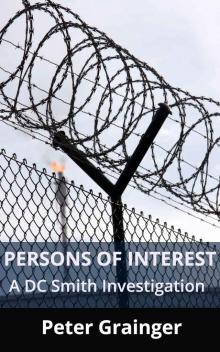 Persons of Interest
Persons of Interest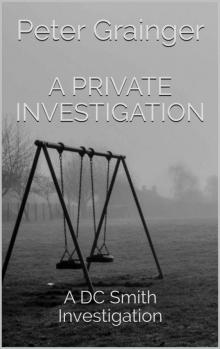 A Private Investigation
A Private Investigation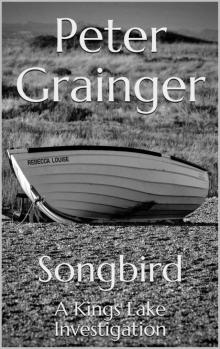 Songbird
Songbird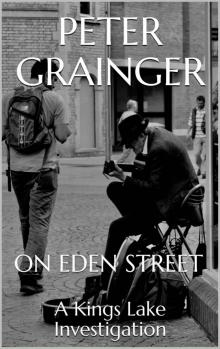 On Eden Street
On Eden Street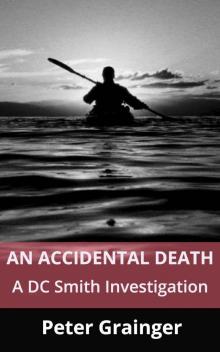 An Accidental Death
An Accidental Death Time and Tide
Time and Tide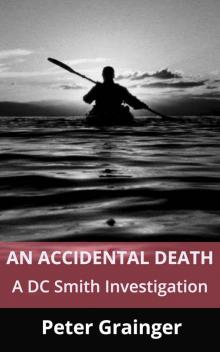 An Accidental Death: A DC Smith Investigation
An Accidental Death: A DC Smith Investigation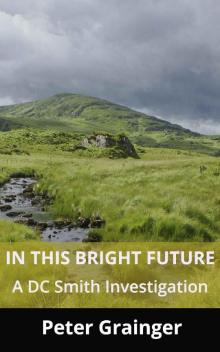 In This Bright Future
In This Bright Future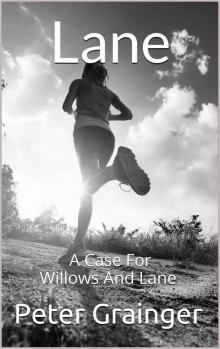 Lane: A Case For Willows And Lane
Lane: A Case For Willows And Lane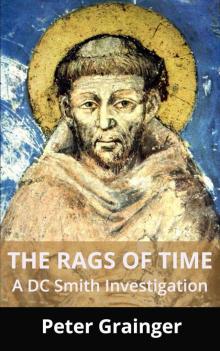 The Rags of Time: A DC Smith Investigation
The Rags of Time: A DC Smith Investigation Luck and Judgement
Luck and Judgement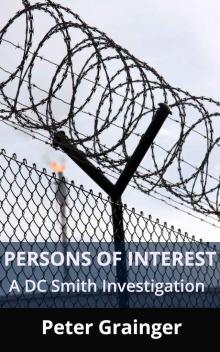 Persons of Interest: A DC Smith Investigation
Persons of Interest: A DC Smith Investigation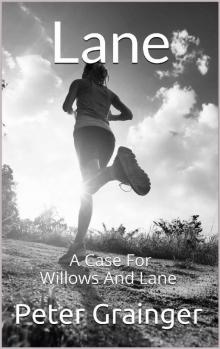 Lane
Lane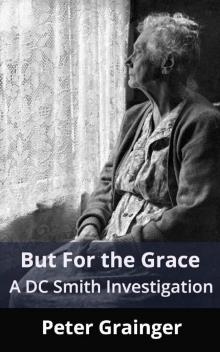 But For The Grace
But For The Grace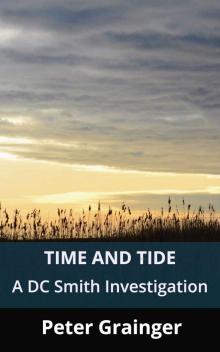 Time and Tide: A DC Smith Investigation
Time and Tide: A DC Smith Investigation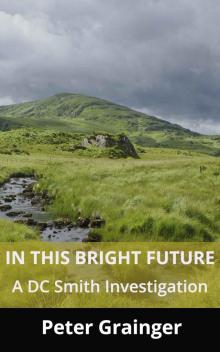 In This Bright Future: A DC Smith Investigation
In This Bright Future: A DC Smith Investigation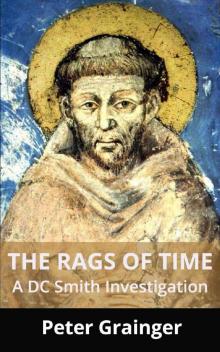 The Rags of Time
The Rags of Time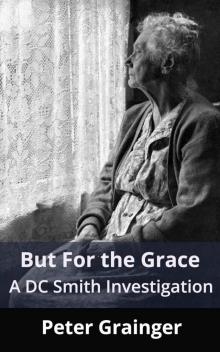 But For The Grace: A DC Smith Investigation
But For The Grace: A DC Smith Investigation Luck and Judgement: A DC Smith Investigation
Luck and Judgement: A DC Smith Investigation